As discussed in our previous post, How to get Published in a Journal: From Writing, to Peer Review, to Acceptance, once you submit your work for publication there are several possible outcomes: your work might be accepted for publication, accepted on condition that certain changes are made, rejected but with the possibility for you to resubmit pending certain changes, or rejected with no opportunity for resubmission. If the journal asks for edits and revision to your work, it’s important not only to implement the changes, but also to write an appropriate and professional response to the journal reviewers.
Sleep On It
Sometimes it can be difficult to see where changes need to be made in your manuscript if you’re too close to it, so taking some time away from both the feedback and your manuscript—to the extent reasonable based on the deadline for resubmission, of course—can be incredibly helpful. In other words, rather than responding immediately, which can lead to defensiveness and knee-jerk responses, try to allow yourself some time to process the feedback, and perhaps read it over again with fresh eyes after a day or two have passed.
Be Respectful and Polite
Sometimes it can be difficult to see eye to eye with a reviewer, especially when it comes to a piece of work you’ve spent so much time and energy on. Keep in mind also that not every reviewer will be an expert in the precise niche to which your work belongs (though they will be representative of the journal’s general audience), so it’s perfectly acceptable to disagree with a point they’ve made. No matter what your response to their feedback, though, remember to always be respectful and polite in your response letter. If you do disagree on some points, outline in an objective and professional manner why you have chosen not to follow their advice, and back up your explanations with reference to extant research where possible and appropriate. It’s also important to remember that if a reviewer has failed to understand something in your writing, it is more likely a fault of your work, or clarity of expression, than their lack of intellect, so always think carefully and objectively before you reject a reviewer’s advice.
Respond to All Comments
Taking time to sit and reread the reviewer’s response to your work will help you make sure you haven’t missed any crucial comments. One of the most common complaints from reviewers is that writers don’t take the time to respond to each and every one of their comments and critiques, and often skip over or completely ignore certain points they’ve raised. If you don’t agree with a comment or find an edit particularly difficult, it’s never a good idea to avoid it by ignoring it altogether. It might take some work on your part to understand the comment or request the reviewer is making, but taking the time to do so will help make your writing stronger.
Quote Changes Directly
When writing your response letter, it’s important to make it easy for the editor and reviewers to follow the edits you’ve made. One of the best ways you can do this is by directly quoting their suggestion in your letter, and, underneath each point, clearly outlining the actions you have taken. It’s also useful to explicitly identify the changes that you have made to your manuscript. You can do this by directly citing page numbers and specific sections, and even pulling extracts from your revised manuscript and pairing them with the reviewer’s own comments so that they can see the ways your manuscript now reflects the edits requested.
Write Multiple Drafts of Your Response
Just as you’ve probably gone through multiple drafts of your manuscript to ensure that it is a strong as possible and meets all journal style requirements, your response letter should be reviewed several times. Writing the first draft of your response freely will give you a space to vent your frustrations and get a better understanding of what, exactly, the reviewers are asking of you. In the second draft take out any emotion, and make sure every point you make is objective, professional, and respectful.
Don’t forget, in addition to editing your paper we can proofread your response letter to editors and reviewers to make sure it’s not only error free, but strikes the right tone.

